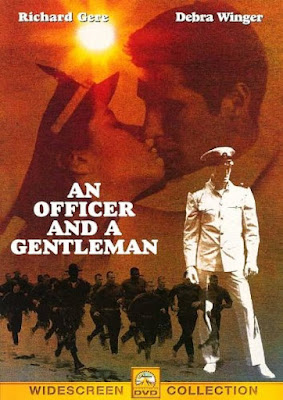The recent passing of actor
Louis Gossett Jr. at the ripe old age of 87 reminded me, of course, of his
greatest screen triumph, in 1982’s An Officer and a Gentleman. For his
portrayal of a tough drill sergeant whose brutal methods mask a tender heart,
Gossett became the first African-American ever to win an Oscar as Best
Supporting Actor. It was a groundbreaking moment: the role had been written for
a white man, but the production team had come to recognize that Black drill
sergeants were not uncommon in the post-Vietnam military services. And Gossett
gives it all he’s got.
Gossett is a marvel in the film, but so is the rest of the cast, led by Richard Gere, Deborah Winger, and David Keith. What struck me in rewatching it recently is how well it fits the dictum of screenwriting guru Paul Lucey, who advises newbies to “write simple stories with complex characters.” Like the Top Gun films, An Officer and a Gentleman is all about would-be flyboys, going through a tough round of training to prepare to pilot combat jets. But whereas Top Gun, starring action hero Tom Cruise, relies heavily on aerial stunt sequences, An Officer and a Gentleman sticks close to the ground. The main thrust of its story involves a thirteen-week training session at which hopefuls (including one plucky woman) go through a series of exhausting physical and mental exercises designed to scare off those unfit to achieve their dreams of flight.
Zack Mayo (leading man Richard Gere) is a particularly hard case. A loner who’s pretty much mad at the world, he has survived his mother’s suicide and his father’s sordid lifestyle as a drunken and womanizing naval petty officer stationed mostly in the Philippines. Having made the surprising decision to enter Officer Candidate School, Zack is determined to leave the program with no strings attached. Which is why Gunnery Sergeant Foley’s warning to avoid getting serious with the marriage-hungry local factory girls makes perfect sense to him. But somehow he makes a friend (David Keith) who is quickly smitten by a buxom blonde ready to play any trick in order to land herself a pilot. And Zack himself is soon making sweet music with her best friend, the feisty Paula (an Oscar-nominated Debra Winger).
As week follows week, the Officer Candidates face more and more pressure, both in their training sessions and in the bedroom. (Director Taylor Hackford, who’d responded particularly to the script’s blue-collar landscape and to its complex characterizations, was frank enough with the script’s enthusiastic sex scenes that the film was originally given an X-rating.) At midpoint Zack, having tried the patience of Sgt. Foley once too often, is hounded into volunteering to quit the program. His stubborn determination—and the final, deeply emotional, acknowledgment that he has nowhere else to go—keep him from leaving of his own accord. Later, though, once he’s faced the dire consequences of a pal’s bad choices, he’s ready to leave the Navy behind. That’s when Sgt. Foley steps in again, leading to a fiercely dramatic confrontation that helps Zack put his life into perspective.
Those who’ve seen An Officer and a Gentleman back in the mists of time will probably remember best its deeply romantic ending, when Zack (resplendent in his white dress uniform) carries off the loving Paula from her place on the local assembly line. It’s fairytale-ish, to be sure, and the filmmakers weren’t originally sold on it. But after all that’s gone before, I believe we feel we and the characters have completely earned this moment of joy.


No comments:
Post a Comment